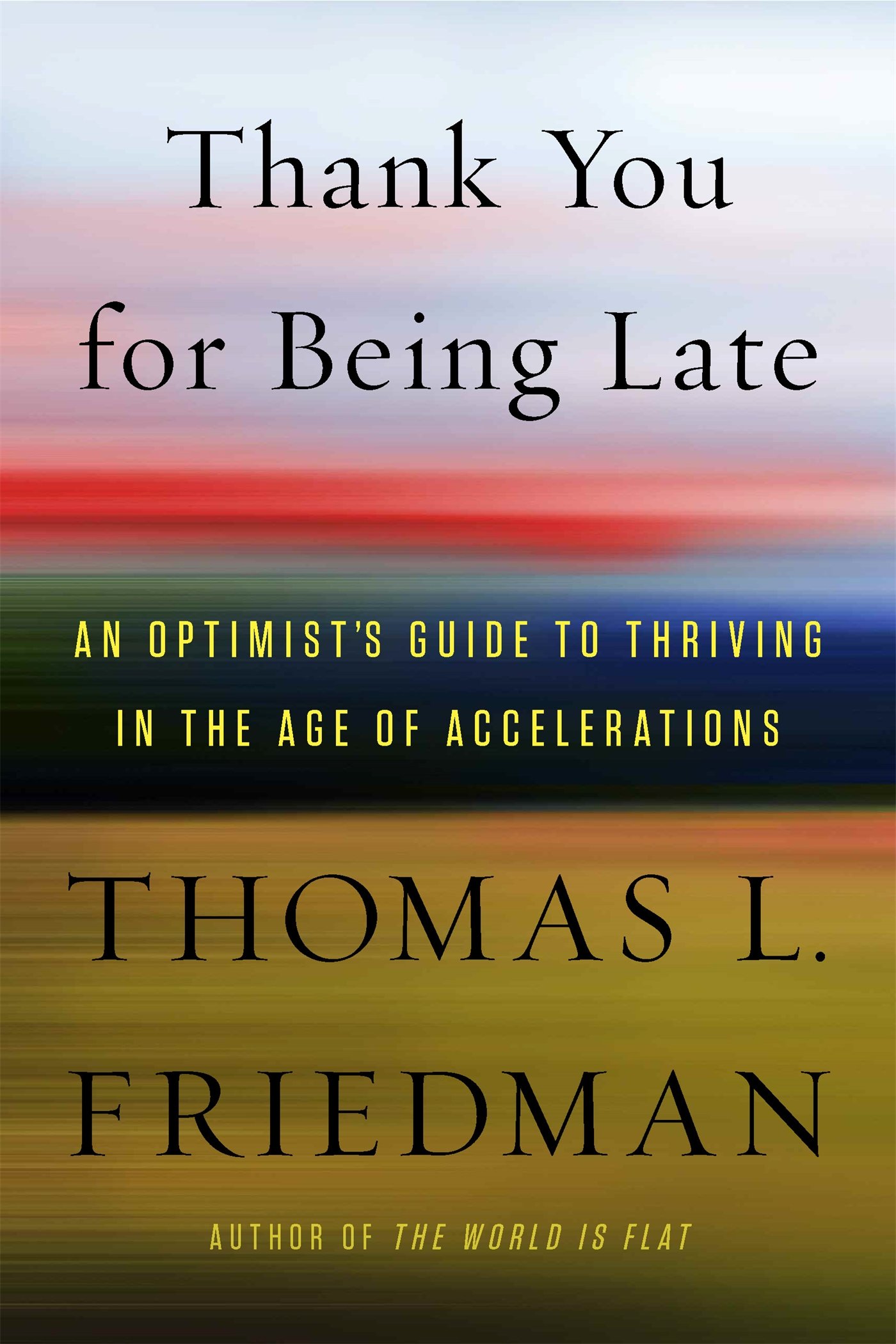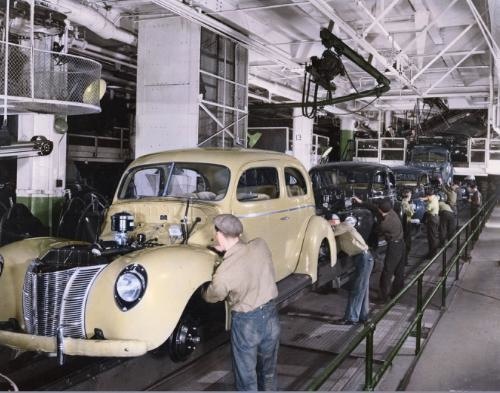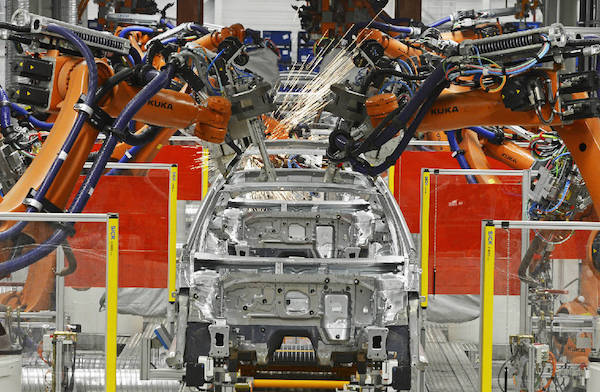


01/16/2017

Tucker Carlson interviewed New York Times columnist Tom Friedman a few days ago about his new book, “Thank You for Being Late: An Optimist’s Guide to Thriving in the Age of Accelerations.” The discussion was about technology, which is the cause of the accelerations from the book title.
Carlson has a new prime-time show on Fox News, and he has apparently been given a degree of freedom about topics to explore, although he has not hit immigration much thus far. On the morning show he once inhabited, he showed a fair amount of interest in mass immigration and how it has affected many areas of American life.
Tom Friedman has lately turned his fuzzy gaze toward technology and the crazy speed-up of society, and even for a liberal columnist, he is a shallow thinker. I watched a C-SPAN video of a recent book talk he gave about the new work and found it to be remarkably boring, particularly for an important and fascinating subject. In his talk with Tucker regarding technology and employment, he chattered on with his little stories of a few new jobs developing in the more automated economy, as if those minuscule examples have anything to do with the economic tsunami we are facing.
Expert opinion is rather dire. A 2013 report from Oxford University researchers estimated that “nearly half of U.S. jobs are vulnerable to computerization” in less than 20 years. The Gartner analytical company predicts that one-third of jobs will be performed by robots by 2025.
How will the economy function in the automated future when paychecks are discontinued because there are no jobs?
In the 1940s, many Americans were employed in the production of cars and trucks.

Now, around 80 percent of automotive manufacturing is done by robots.

Why isn’t Washington facing the jobless automated future? At the least, immigration should be terminated as a government policy, because automation has made immigration obsolete.
Tucker Carlson does seem to have sniffed out this logical progression, but Friedman appeared nervous to have his trite ideas about immigration challenged even a tiny bit.
(Spare Audio)
TUCKER CARLSON: When a lot of us were born, personal computers didn’t even exist; today of course they’re totally ubiquitous, and they’re making more and more jobs obsolete. Today it’s McDonald’s employees, tomorrow it’ll be millions of truck and taxi drivers with self-driving cars. Eventually it will be lawyers and physicians and so on. Will it ever be newspaper columnists and cable news anchors? We’re praying not!Joining this now is New York Times opinion columnist Thomas Friedman, author of ”Thank You for Being Late: An Optimist’s Guide to Thriving in the Age of Accelerations”. Tom, thanks for coming on. You’re very optimistic in this book, and I appreciate that because I love optimism, but I wondered as i read it, are people wired, from an evolutionary standpoint, to digest this pace of change?
TOM FRIEDMAN: There’s no question Tucker that what’s going on in globalization, in technology in particular, is now faster than the average rate at which humans and societies can adapt. I think people are feeling that sense of acceleration. One of my favorite quotes in the book is from John Kelly around the IBM Watson project, and he said to me when I was working on the book. he said you know Tom, when you buy a car, it comes with a sticker on the rear view mirror. It says objects in your rear-view may be closer than they appear that actually belongs in your front windshield out because it’s the stuff coming at us is actually coming faster than you think. In fact I had an experience in this book I’ve never had before — I felt I had a butterfly net and I was chasing a butterfly and every time I got close, it moved. I had to interview the head of Intel at least three times in writing this book just to make sure nothing changed from six months earlier. So I was actually living that pace of change.
CARLSON: So I mean it’s no one person’s fault of course, though I do think a lot of us are very insensitive to its consequences, among them the political consequences. The last time we had a big technological disruption — the Industrial Revolution — we got 70 years of totalitarian Marxism out of that, our response to that. This is a more profound change, I mean how can you be hopeful about the political consequences?
FRIEDMAN: A good question. It certainly is more profound because it’s hitting both white collar and blue collar at the same time, and yet today even with all that going on, we have four-and-a-half percent unemployment, yes, people dropped out of the labor force, but I’m optimistic because we’ve actually done this before. Remember, almost a hundred percent of its use to live and work on farms and then they worked in factories and then they found service jobs, then knowledge jobs. Obviously we’ve done this before.
This is going to be harder, okay, there’s no question about it, but I have a huge faith in American creativity. I was at a conference a few months ago, a woman was who there said her job was tagging sharks for Twitter. I said, Who in the world ever thought there’d be a job tagging sharks for Twitter I certainly didn’t. The point is talking you’ll never see it coming, you’ll never see these new jobs coming, but if we remain open and flexible, which is absolutely our value-added as a country, I believe we’re going to find a whole set of jobs. You can imagine a lot of them, Tucker, will be people dealing with people.
I wrote last week about my friend Dov Seidman’s idea that first we work with our hands, then we work more with our heads, now we’re going to work more with our hearts. Okay, that is people dealing with people. The fastest-growing restaurant chain in America 2015 I wrote about is called Paint Nite. It’s people who conduct paint-by-numbers basically, for adults in bars. Whoever thought there’d be a business doing that, but turns out people really want to be with people.
I have an interview with the Surgeon General in there, Vivek Murthy, and I asked him what’s the most prevalent disease in America’s — heart disease, is it diabetes, is it cancer? He said it’s isolation. Well think about that — we live in the most technological age but the Surgeon General says there are huge numbers of us, people feeling isolated. I think connecting people to people will be a huge job.
CARLSON: Maybe technology leads to isolation.
FRIEDMAN: And I think it does, absolutely.
CARLSON: It’s easy for us who are thriving, relatively speaking, in this economy, but the idea that people who are displaced by technology are going to seamlessly — or at all — find a place in this new order is really hard to believe. You can teach a farmer to run a drill press, but you can’t you can’t teach one to write code, or a cable news host to write code, you just can’t, so what about those people?
FRIEDMAN: Because my point is I don’t think that’s what’s going to be the cutting edge of the jobs. I think the best jobs actually are going to be these people-to-people jobs. Some people write code, unfortunately computers will soon be writing code, and so I think we’re going to see a whole new set of jobs and industries really around the heart, around connecting people to people, maybe through restaurants to entertainment. Think of our generation — how many people are going to need eldercare as the baby boomers retire. So I’m much more optimistic.
CARLSON: I’m glad you’re optimistic. I’m not, but I’m glad somebody is. I don’t understand at a moment of change this profound, why you would want to add demographic and cultural and economic changes on top of economic change, and I know it benefits of a small number of employers who want cheaper labor, but why would you want to let in low-skilled labor, no promises participating in this new economy — how does that help anybody?
FRIEDMAN: My view in sort of openness in general is what I say in the book and always said: I’m for a high wall with a big gate, okay, which is I believe a country has to control its borders, I’m a big believer in that, but I also believe what has made America great is that we have attracted more high IQ risk-takers than any country in the world, and high-energy risk-takers, okay they may be lower skilled but high energy that’s what’s made…
CARLSON: Shouldn’t we screen, because our current immigration says that if you have a relative here, you get to come. Shouldn’t we say Wait a second. Are you impressive or not?
FRIEDMAN: I’m really agnostic on on how we best bring in these people but what I would hate to see us do, Tucker, is to close off America as this giant magnet. We are who we are as a country because we’ve attracted more of these risk-takers — my great-grandparents and somewhere your great-grandparents — who left somewhere bad and came to somewhere they thought were better. An Armenian friend of mine likes to say the new immigrants are paranoid optimists, they’re optimists because they came from somewhere bad to somewhere they hope is better, but they’re always paranoid, they’re afraid it can be taken away from them: that makes them enormously energetic. We’ve got to balance that; obviously I’m not for opening the borders.
CARLSON: I get it. I myself am a refugee from California. I know that feeling.